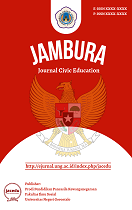 | Journal title Initials Frequency Language ISSN DOI Editor-in-Chief Publisher APC OAI Address | : Jambura Journal Civic Education : Jacedu : Biannual (Mei and Novemver) : Indonesia : 2798-4818 (Online), 2808-2249(Print) : Prefix 10.37905 : Yuli Adhani : Civic Education Study Program, Universitas Negeri Gorontalo : (submission, publishing) : http://ejurnal.ung.ac.id/index.php/jacedu |
Jambura Journal Civic Education (jacedu, E-ISSN 2798-4818 and P-ISSN 2808-2249) is a peer-reviewed journal published by Civic Education Study Program, Faculty Social Sciences, Universitas Negeri Gorontalo. Jacedu provides open access to the principle that research published in this journal is freely available to the public to support the exchange of knowledge globally. Jacedu published two issue articles per year namely Mei and November Jacedu provides a place for academics, researchers, and practitioners to publish social sciences articles. Each text sent to the JACEDU editor is reviewed by peer review. Starting from Vol. 1 No. 1 (July, 2021), all manuscripts sent to the Jacedu editor are accepted in Bahasa Indonesia or English. The scope of the articles listed in this journal relates to various topics, including:
- Belief in the one and only God (Ketuhanan Yang Maha Esa): This principle emphasizes the belief in a higher power. In Indonesia, which is a diverse country with various religious beliefs, this principle promotes tolerance and respect for different religions.
- Just and civilized humanity (Kemanusiaan yang adil dan beradab): This principle highlights the value of justice, equality, and human dignity. It promotes the idea that all human beings are equal regardless of race, ethnicity, religion, or social status.
- The unity of Indonesia (Persatuan Indonesia): This principle underscores the importance of national unity and integrity. It emphasizes the idea that despite Indonesia's diverse ethnic, cultural, and linguistic backgrounds, all citizens are part of a unified nation.
- Democracy guided by the inner wisdom in the unanimity arising out of deliberations amongst representatives (Kerakyatan yang dipimpin oleh hikmat kebijaksanaan dalam permusyawaratan/perwakilan): This principle advocates for democracy as the basis of governance, where decisions are made through deliberations and consensus among representatives. It also stresses the importance of wise and just leadership.
- Social justice for all of the people of Indonesia (Keadilan sosial bagi seluruh rakyat Indonesia): This principle emphasizes equitable distribution of wealth, equal access to opportunities, and social welfare for all citizens. It aims to reduce socio-economic disparities and promote the well-being of the entire population.
Announcements
CHANGE IN PUBLICATION SCHEDULE |
|
| Starting in 2022, Jacedu publication schedule is changed from July and Desember to Mei and November. | |
| Posted: 2022-12-28 | |
| More Announcements... |
Vol 5, No 1 (2025): Vol.5 No.1 Mei 2025
Table of Contents
Articles
|
Halimaton Aton Sakdiah,
Syiah Kuala University,
Indonesia
Irwan Putra, Syiah Kuala University, Indonesia Hasbi Ali, Syiah Kuala University, Indonesia |
|
|
Widyatul Aulia,
University of Mataram,
Indonesia
Mohamad Mustari, University of Mataram, Indonesia Basariah Basariah, University of Mataram, Indonesia Bagdawansyah Alqadri, University of Mataram, Indonesia |
|
|
Intan Nurain Arsala,
State University of Gorontalo,
Indonesia
Sastro M Wantu, State University of Gorontalo, Indonesia Ramli Mahmud, State University of Gorontalo, Indonesia Zulfikar Adjie, State University of Gorontalo, Indonesia |
|
|
Suci Cahyati,
Mataram State University,
Indonesia
Lalu Sumardi, Mataram State University, Indonesia Sawaludin Sawaludin, Mataram State University, Indonesia Yuliatin Yuliatin, Mataram State University, Indonesia |
|
|
Fransika Laatung,
Manado State University,
Indonesia
Theodorus Pangalila, Manado State University, Indonesia |
|
|
Khansa Naura Mumtaza Suwandi,
University of Muhammadiyah Malang,
Indonesia
Rohmad Widodo, University of Muhammadiyah Malang, Indonesia M. Syahri, University of Muhammadiyah Malang, |
|
|
Eko Satria,
Universitas Muhammadiyah Buton,
Indonesia
Nopiana Mozin, Universitas Negeri Gorontalo, Al Hiday Nur, Universitas Muhammadiyah Buton, |
|
|
Ariyanto Nggilu,
Universitas Negeri Gorontalo,
Indonesia
Zulaecha Ngiu, Universitas Negeri Gorontalo, Indonesia Udin Hamim, Universitas Negeri Gorontalo, Indonesia Asmun W. Wantu, Universitas Negeri Gorontalo, Indonesia |
|
|
Dwi Filadelfia Indah,
Huangshi, Hubei Province, Hubei Polytechnic University,
China
Yinarti Hida, IAIN Sultan Amai Gorontalo, Gorontalo City, Indonesia, Indonesia |
|
|
Moh. Dandriyandi I. H. Tomu,
Hubei Polytechnic University, China,
China
Yayan Sahi, Universitas Negeri Gorontalo, Indonesia |
|










.png)







